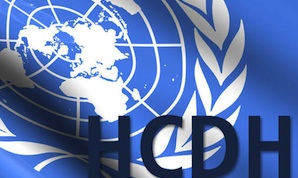International Advocacy

A symptom of abject poverty, the face of destitution, noma is a devastating, rapidly advancing necrosis that develops in the mouth, beginning with a benign lesion and eventually ravaging the face horribly, quickly destroying its soft tissue and bone. It profoundly disfigures its victims, mostly young children aged between 2 and 6, and leads to death in 80% to 90% of cases. The victims will never again be able to eat, speak and breathe normally. Most of the time, they will be rejected by their communities, which consider them to be cursed.

Human Rights
Noma on the human rights program.
By adopting, in March 2012, a resolution that adopts noma as an emblematic illness and establishes a link between severe malnutrition and childhood diseases, the Human Rights Council has recognized noma as a marker of extreme poverty.
This is the first official international recognition for this neglected disease. It will help reinforce the credibility of the case which the Winds of Hope Foundation is laying before the highest national and international authorities, so as to give better protection to the human rights of malnourished children, and improve the effectiveness of action taken to combat the appalling affliction of noma.
At its most recent plenary session, the United Nations (UN) Human Rights Council adopted a study on « Severe malnutrition and childhood diseases, with children affected by noma as an example (link: UN Doc. A/HRC/AC/8/7) ».This study brings to light the importance, for their general state of health, of the socio-economic circumstances in which children are born, grow-up and live. Among its recommendations are that:
• The fight against poverty and malnutrition be reinforced and implemented in conformity with the principles of human rights;
• Efforts aimed at combating noma be reinforced not only in Africa but also throughout the world. In this respect the WHO should, as a matter of urgency, put in place machinery for international coordination, which must include prevention, early detection, availability of primary healthcare, reparative surgery and study of the etiology of noma;
• Noma be officially listed by WHO as a neglected disease, the aim being, amongst others, to raise awareness in governmental authorities, and amongst private donors, the medical community and the public at large;
• The states affected should establish national anti-noma action plans and nominate a person to be responsible for monitoring the implementation of these plans.
The Annex to the study lays particular emphasis on the principles of human rights and guidelines for improving the protection of the most vulnerable children, so as to fill gaps in present arrangements for combating noma and changing the status of this neglected disease. (Annex A/HRC/19/73).
Malnutrition – recognized as a human rights violation – is considered to be the main risk factor for noma. Therefore, when the 47 member states of the Human Rights Council unanimously recognized the importance of this study in March 2012, it was a major step forward.
This work, initiated in 2009 at the suggestion of Winds of Hope, was carried out by Mr. Jean Ziegler, a member of the United Nations Human Rights Council Advisory Committee and Ms Ioana Cismas, with the active participation of the Winds of Hope Foundation.
The UN Human Rights Council, with 47 member states, is the main UN inter-governmental body charged with promoting and protecting human rights. It periodically examines the human rights situation in each of the 193 UN member states.
The UN Human Rights Council Advisory Committee, consisting of 18 independent experts, has as its main function the commissioning of studies to throw light on the difficulties encountered by populations in the areas that require a particular attention of the Human Rights Council.
Mr. Jean Ziegler is a swiss politician and sociologist, he is a member of the UN Human Rights Council Advisory Committee. He was the former UN’s special rapporteur on the question of the right to food in the world. He is the author of numerous works in which he analyses the right to food question, amongst others.







